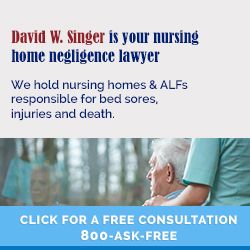The coronavirus pandemic has devastated the nation as experts scramble to figure out the best way to contain the disease and protect vulnerable populations. One of the most vulnerable populations are the elderly, and unfortunately for some groups of elderly, attempts at containment, quarantine, and protection may have been too little too late. Here David W. Singer and Associates answer your legal questions when it comes to nursing home neglect and coronavirus.
- Am I able to sue a nursing home for coronavirus (COVID-19) infection and injuries?- As the disease spread rapidly on U.S. soil, nursing homes quickly became hot spots for the spread of the virus. For many nursing home residents, infections such as coronavirus (COVID-19) may be especially fatal. This is the reason why nursing homes and assisted living facilities are required by federal law to monitor residents for the presence of infections in order to minimize the occurrence of infection along with attempting to control outbreaks. If the appropriate protocols to identify and limit the spread of coronavirus (COVID-19) were not appropriately implemented in a nursing home facility, then they may be open to legal action.
- The measures that nursing homes typically take in order to prevent infections and outbreaks- When an infection control protocol is put into action at a nursing home or long-term care facility, workers across all programs, services, and settings will collaborate with the shared aim of:
- Minimizing the risk of infection in individual residents
- Lessening the risk of transmission among and between residents and healthcare workers
- Lessening the risk of injections developing in residents that are related to the use of medical devices and procedures required as part of their care

Here is what a nursing home infection protocol should look like:
- Put in place stricter sanitation requirements: frequent cleaning and disinfecting of surfaces and objects is a must when it comes to controlling the spread of viruses such as coronavirus (COVID-19).
- Taking the appropriate measures to disinfect all tables, chairs, beds, and surfaces: Not doing so could constitute the nursing home being neglected.
- Changing equipment stipulations: The U.S. CDC has recommended that all healthcare workers in nursing homes and assisted living facilities wear masks in order to prevent the spread of coronavirus (COVID-19). If a nursing home has not provided masks to all aides, nurses, and healthcare workers, then negligence may have occurred.
- Isolate potentially infected residents: One of the best ways to stop the spread of coronavirus (COVID-19) is isolation and quarantine. If a resident displays symptoms of the disease and was not isolated from other at-risk residents, then negligence may have happened.
In order to accomplish all of this, the facility will rely on surveillance, ongoing analysis of surveillance data, appropriate infection prevention procedures, and monitoring the adherence to these procedures throughout all of the departments and individuals who work with the facility.
Attempts to respond to an outbreak may be hampered and hindered by an unfortunate lack of appropriate training and limited resources. What matters when it comes to negligence on a nursing home is whether or not the facility and its staff were able to take reasonable measures in order to respond to and control the outbreak.
If you or a loved one was exposed to coronavirus (COVID-19) in a nursing home, then you may want to seek legal counsel and consult with an attorney. Call David W. Singer and Associates today for a free initial consultation.


Recent Comments